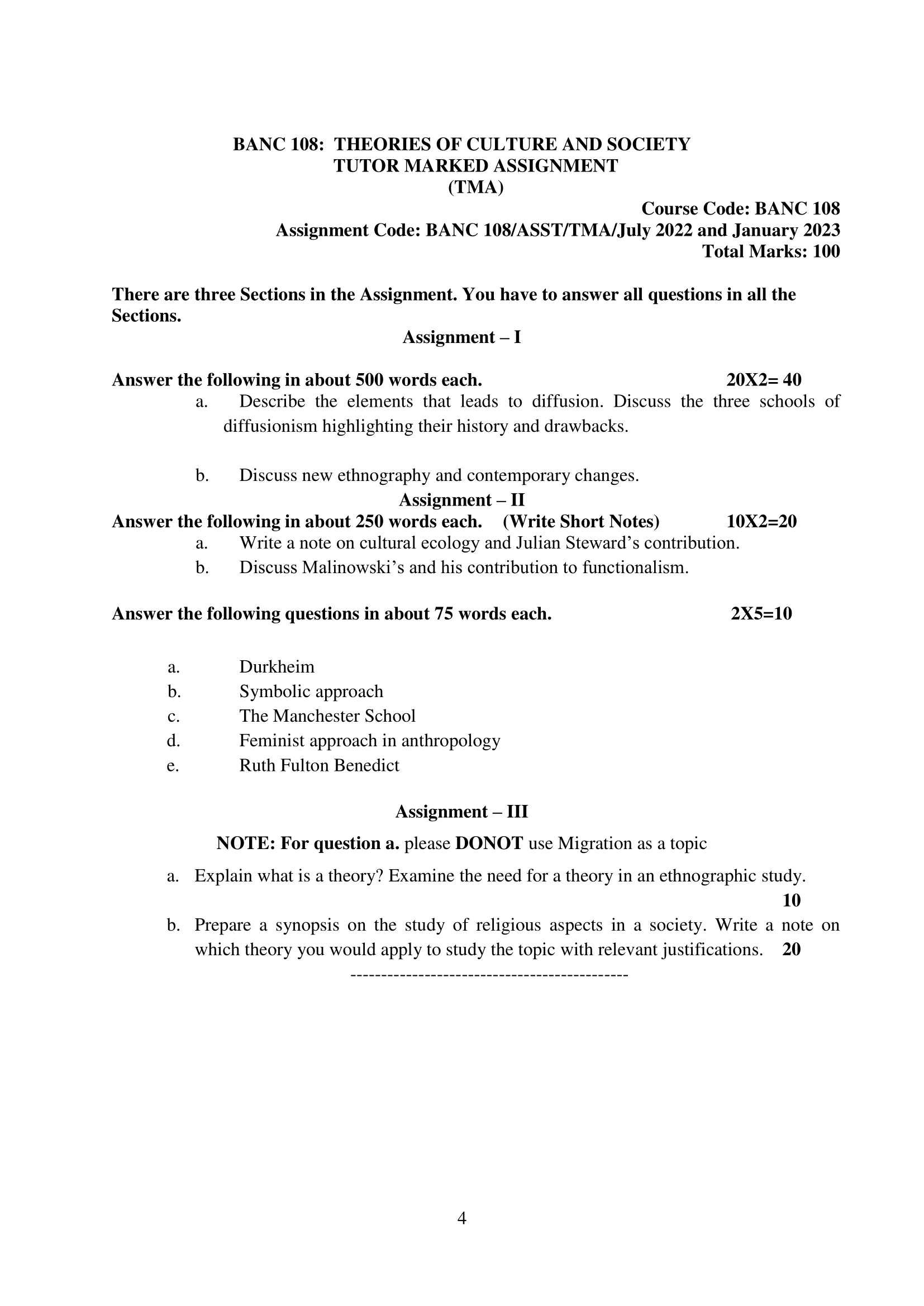Contents
- 1 Assignment – I
- 2 Answer the following in about 500 words each. 20X2= 40
- 3 a. Describe the elements that leads to diffusion. Discuss the three schools of diffusionism highlighting their history and drawbacks.
- 4 b. Discuss new ethnography and contemporary changes.
- 5 Assignment – II
- 6 Answer the following in about 250 words each. (Write Short Notes) 10X2=20
- 7 a. Write a note on cultural ecology and Julian Steward’s contribution.
- 8 b. Discuss Malinowski’s and his contribution to functionalism.
- 9 Answer the following questions in about 75 words each. 2X5=10
- 10 a. Durkheim
- 11 b. Symbolic approach
- 12 c. The Manchester School
- 13 d. Feminist approach in anthropology
- 14 e. Ruth Fulton Benedict
- 15 Assignment – III
- 16 a. Explain what is a theory? Examine the need for a theory in an ethnographic study.
- 17 b. Prepare a synopsis on the study of religious aspects in a society. Write a note onwhich theory you would apply to study the topic with relevant justifications.

| Title | BANC-108 |
| University | IGNOU |
| Degree | Bachelor Degree Programme |
| Course Code | BANC-108 |
| Course Name | Theories Of Culture And Society |
| Programme Name | Bachelor of Arts (General) |
| Programme Code | BAG |
| Total Marks | 100 |
| Year | 2022-2023 |
| Language | English |
| Assignment Code | BANC 108/ASST/TMA/JULY 2022 AND JANUARY 2023 |
| Last Date for Submission of Assignment: | For June Examination: 31st April For December Examination: 30th September |

Assignment – I
Answer the following in about 500 words each. 20X2= 40
a. Describe the elements that leads to diffusion. Discuss the three schools of diffusionism highlighting their history and drawbacks.
Ans: Diffusion refers to the spread of ideas, practices, technologies, and other forms of cultural elements from one group to another. There are several factors that can contribute to the diffusion of cultural elements, including:
- Migration: People who move from one place to another can bring their cultural practices with them, which can then be adopted by others.
- Trade: The exchange of goods and services between different groups can also result in the diffusion of cultural elements.
- Mass media: The widespread availability of communication technologies, such as television, radio, and the internet, has made it easier for people to access information and ideas from other parts of the world, leading to the spread of cultural elements.
- Conquest and colonization: The conquest of one group by another can result in the diffusion of the conqueror’s cultural elements to the conquered group. This can happen through the introduction of new institutions, language, religion, and other cultural elements by the conqueror.
The study of diffusion is traditionally divided into three schools of thought:
- Diffusionism: This school of thought was first developed in the late 19th and early 20th centuries and emphasized the spread of cultural elements through migration and trade. Diffusionists believed that all cultures developed from a single origin and that the spread of cultural elements was a result of the movement of people and goods from one place to another.
- Cultural Ecology: This school of thought emerged in the mid-20th century and focused on the relationship between culture and environment. Cultural ecologists believed that cultural elements diffuse as a result of adaptation to the physical and social environment, and that cultural diffusion was a result of the need for cultural groups to adapt to changing environmental conditions.
- Neo-Evolutionism: This school of thought emerged in the mid-20th century and emphasized the role of technology in the diffusion of cultural elements. Neo-evolutionists believed that technological innovations were the primary drivers of cultural diffusion, and that the spread of cultural elements was a result of the diffusion of new technologies from one group to another.
Each of these schools of thought has its own strengths and weaknesses. For example, diffusionism has been criticized for being too focused on migration and trade as the primary drivers of cultural diffusion, and for failing to account for the role of other factors such as conquest and colonization. Cultural ecology has been criticized for neglecting the role of human agency in the spread of cultural elements, and for failing to account for the influence of cultural elements on the physical environment. And, neo-evolutionism has been criticized for being too focused on technology as the driving force behind cultural diffusion, and for failing to account for the influence of other factors such as ideology and political systems.
b. Discuss new ethnography and contemporary changes.
Ans: New ethnography refers to a recent shift in anthropological method and theory that has challenged traditional ethnographic practices and produced new ways of doing fieldwork and writing about culture. This shift has been driven by a number of contemporary changes, including changes in the global political economy, new technologies, and new theoretical developments in the social sciences.
One of the key changes that has driven new ethnography is the globalization of culture. As the world has become more interconnected and cultures have become more intertwined, anthropologists have had to re-evaluate traditional ethnographic methods and theories to better understand these complex cultural relationships. For example, many new ethnographers have embraced multi-sited fieldwork, which involves conducting research in multiple locations to better understand the ways in which cultural elements are spread and transformed across different cultural contexts.
Another major change that has influenced new ethnography is the rise of new technologies. The widespread availability of the internet, social media, and mobile devices has created new opportunities for anthropologists to collect and analyze data, and has changed the ways in which people experience and participate in cultural practices. Many new ethnographers have embraced digital methods and are using digital technologies to collect and analyze data in new and innovative ways.
In addition to these changes, new ethnography has also been influenced by new theoretical developments in the social sciences. For example, postcolonial theory has challenged traditional anthropological assumptions about power and culture, and has encouraged anthropologists to examine the ways in which colonialism and imperialism have shaped cultural relationships and identities. Feminist and queer theory have also challenged traditional ethnographic assumptions about gender and sexuality, and have encouraged anthropologists to examine the ways in which these concepts are constructed and experienced in different cultural contexts.
New ethnography has also been characterized by a greater emphasis on collaboration and reflexivity. Many new ethnographers are working with communities and other stakeholders in the research process, and are using ethnographic methods to facilitate dialogue and collaboration between researchers and their subjects. At the same time, new ethnographers are more aware of their own biases and the ways in which their research may shape the communities they study, and they are using reflexive practices to reflect on their own positions and the impact of their research.
Assignment – II
Answer the following in about 250 words each. (Write Short Notes) 10X2=20
a. Write a note on cultural ecology and Julian Steward’s contribution.
Ans: Cultural Ecology is a branch of anthropology that studies the interactions between human cultures and their environments. It emphasizes the dynamic relationship between cultural systems and the natural systems that shape and are shaped by them. Cultural ecology views human societies as part of the ecosystem and investigates how culture influences and is influenced by the natural environment.
Julian Steward is considered the founder of Cultural Ecology. He was an American anthropologist who developed the concept in the 1930s and 1940s. Steward’s contributions to the field include his theory of cultural evolution, which asserts that cultures evolve through a process of adaptation to environmental challenges. He believed that cultures could be understood by examining their adaptation to specific environmental contexts. He also developed the idea of “cultural cores,” which are essential cultural traits that are passed down through generations and shape a culture’s relationship with the environment.
Steward’s work has had a significant impact on the study of cultural ecology, shaping the direction of research in the field and influencing later anthropologists. His ideas on cultural adaptation and evolution have been widely adopted, and his concept of cultural cores continues to be a useful tool for understanding cultural systems and their relationships with the environment.
b. Discuss Malinowski’s and his contribution to functionalism.
Ans: Bronislaw Malinowski was a Polish-born British social anthropologist who is considered one of the founders of modern social anthropology and a key figure in the development of functionalism as an anthropological theory.
Malinowski is best known for his ethnographic work in the Trobriand Islands of the western Pacific, where he conducted fieldwork between 1915 and 1918. He was one of the first anthropologists to use the method of participant observation, living among the Trobrianders and studying their culture from the inside out. His ethnographic work provided a detailed picture of Trobriand society and showed the interdependence of cultural institutions and practices.
Malinowski’s contribution to functionalism was to provide a functionalist perspective on the role of cultural practices and institutions in society. He argued that cultural practices and institutions serve to meet the basic needs of society, such as food, shelter, and security, and that they are interdependent and work together to ensure the survival and stability of the society. In his view, cultural practices and institutions are not arbitrary or meaningless, but rather serve a specific function in maintaining the balance and stability of society.
Malinowski’s functionalist perspective was influential in shaping the development of functionalism as a theoretical approach in anthropology and other social sciences. It emphasized the idea that social and cultural practices and institutions are integrated and interdependent, and that they serve a purpose in maintaining the stability and survival of society. This view of society as a functioning system has been widely adopted and has had a lasting impact on the discipline of anthropology and beyond.
Answer the following questions in about 75 words each. 2X5=10
a. Durkheim
Ans: Emile Durkheim was a French sociologist and one of the founders of modern sociology. He is best known for his work on the integration of society and the role of social institutions in maintaining social order. Durkheim believed that social order was necessary for the survival of society and that social institutions, such as the family, religion, and education, played a crucial role in maintaining this order. He was particularly interested in the study of social deviance and the relationship between deviance and social solidarity. Durkheim’s ideas have had a lasting impact on sociology and continue to be widely studied and debated.
b. Symbolic approach
Ans: The symbolic approach is a perspective in sociology and anthropology that emphasizes the importance of symbols, meanings, and cultural understandings in shaping social behavior and relationships. This approach views social life as a product of shared symbolic systems, such as language, beliefs, values, and norms, and it emphasizes the role of symbols in shaping social action and social structure. In the symbolic approach, meaning is seen as a central aspect of social life, and symbols are viewed as the building blocks of social reality. This perspective is often contrasted with other approaches, such as the functionalist and conflict approaches, which focus on the material and structural dimensions of society. The symbolic approach has been influential in shaping the study of culture, identity, and communication and continues to be widely used in the social sciences.
c. The Manchester School
Ans: The Manchester School of Anthropology refers to a group of social anthropologists associated with the University of Manchester in the mid-20th century. The Manchester School is characterized by a focus on political and economic anthropology and the study of social change and modernization in non-Western societies. The school was particularly known for its emphasis on fieldwork and the use of a comparative method to study social change and development.
Members of the Manchester School, including Max Gluckman and A.R. Radcliffe-Brown, were concerned with understanding the social and cultural consequences of modernization and the relationship between political and economic systems and cultural practices. They also emphasized the importance of understanding the relationships between different levels of social organization, such as the household, the community, and the state.
The Manchester School had a significant impact on the development of anthropology as a discipline, particularly in the area of political and economic anthropology. Its approach to the study of social change and modernization continues to be widely used in contemporary anthropology, and its emphasis on fieldwork and comparative method remains influential in the discipline.
d. Feminist approach in anthropology
Ans: The feminist approach in anthropology is a perspective that recognizes the importance of gender and gender relations in shaping social and cultural life. It is concerned with understanding the ways in which gender relations and inequalities are produced and maintained, and the impact of these relations on the experiences of individuals and communities.
Feminist anthropology emerged in the late 1960s and 1970s as a response to the male-dominated field of anthropology and its failure to incorporate the experiences of women and the study of gender into its research and theorizing. Feminist anthropologists sought to bring attention to the ways in which gender operates in society, and to challenge the assumption that gender is a natural and universal aspect of human life.
Feminist anthropology is characterized by a focus on the intersection of gender with other social categories, such as race, class, and sexuality, and the ways in which these intersections shape experiences and identities. Feminist anthropologists also prioritize the use of qualitative methods, such as participant observation and interviews, as well as the voices of women and other marginalized groups in their research.
e. Ruth Fulton Benedict
Ans: Ruth Fulton Benedict was an American anthropologist who made important contributions to the study of culture and personality. She was born in 1887 and studied at Columbia University, where she was influenced by the work of Franz Boas and became part of the Boasian tradition in American anthropology.
Benedict is best known for her work on the relationship between culture and personality, and her view that culture shapes the personality of individuals. She believed that culture could be seen as a kind of pattern, or a configuration of beliefs, values, and practices that shape the way individuals experience the world and interact with others. Benedict was particularly interested in studying the cultures of non-Western societies, and her work focused on the study of Native American, Pacific Islander, and other indigenous cultures.
Benedict’s work was groundbreaking in the field of anthropology, as it emphasized the importance of culture as a shaping force in human personality and behavior. Her work also challenged traditional views of cultural evolution and provided a new perspective on cultural relativism. Benedict was a key figure in the development of American anthropology and her ideas continue to be widely studied and discussed today.
Assignment – III
a. Explain what is a theory? Examine the need for a theory in an ethnographic study.
Ans: A theory is an explanation or model of how different aspects of the world are related and interact with each other. In the social sciences, theories help to explain why and how social phenomena occur, and provide a framework for understanding and analyzing complex social relationships and processes.
The need for a theory in an ethnographic study is rooted in the fact that ethnography is an interpretive discipline, and theories provide a way of making sense of the data collected through fieldwork. Theories help ethnographers to develop hypotheses about the social phenomena they are studying, and to analyze their data in a systematic and meaningful way. By providing a framework for analysis, theories help ethnographers to identify patterns, connections, and relationships in their data, and to generate meaningful and significant insights about the cultural practices and experiences of the people they are studying.
In addition to helping with the analysis of data, theories also help ethnographers to contextualize their findings within a larger intellectual framework. By drawing on existing theories, ethnographers can situate their work within the larger intellectual discourse on a particular topic, and can engage with other scholars who are working on similar questions.
Finally, theories also play an important role in the development of ethnographic knowledge. By testing and refining existing theories, or by developing new theories based on their own research findings, ethnographers contribute to the development of the discipline and help to advance our understanding of the social world.
b. Prepare a synopsis on the study of religious aspects in a society. Write a note on
which theory you would apply to study the topic with relevant justifications.
Ans: Religious aspects play a significant role in shaping the beliefs, values, and practices of individuals and communities in a society. The study of religious aspects in a society seeks to understand the role that religion plays in shaping social relationships, cultural norms and practices, and the ways in which religious beliefs influence individual and collective behavior.
To study the religious aspects in a society, one could apply the social constructionist theory. This theory views religion as a culturally constructed phenomenon that is shaped by social, political, and economic factors. According to this theory, religion is not just a matter of belief or practice, but is also shaped by larger cultural and historical forces that give meaning to religious beliefs and practices.
The social constructionist theory is well-suited to the study of religious aspects in a society for several reasons. First, this theory recognizes that religion is not a static or universal phenomenon, but is instead shaped by the particular cultural, political, and economic context in which it is practiced. This allows researchers to examine the ways in which religion is adapted and transformed as it is adopted by different communities in different cultural and historical contexts.
Second, the social constructionist theory provides a framework for examining the intersections between religion and other social and cultural phenomena, such as politics, economics, and power. This allows researchers to understand the ways in which religion is used to support or challenge social and political systems, and the ways in which religious beliefs and practices are influenced by larger social, political, and economic forces.
Finally, the social constructionist theory encourages a reflexive approach to research, which recognizes the ways in which the researcher’s own background and beliefs influence their interpretation of religious practices and beliefs. This approach allows researchers to critically examine their own biases and assumptions, and to understand the ways in which their own cultural background shapes their understanding of religious practices and beliefs in other cultures.
How to Download BANC-108 Solved Assignment?
You can download it from the www.edukar.in, they have a big database for all the IGNOU solved assignments.
Is the BANC-108 Solved Assignment Free?
Yes this is absolutely free to download the solved assignment from www.edukar.in
What is the last submission date for BANC-108 Solved Assignment?
For June Examination: 31st April, For December Examination: 30th October






![Best 5 Speech on Yoga [Long & Short] Speech-on-Yoga](https://edukar.in/wp-content/uploads/2023/03/Speech-on-Yoga.webp)
![Speech on Subhash Chandra Bose [Short & Long] Speech-on-Subhash-Chandra-Bose](https://edukar.in/wp-content/uploads/2023/03/Speech-on-Subhash-Chandra-Bose.webp)








